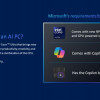Ogg Vorbis - a brief look.
By: Yeah
One day I got this phone call from a crazy friend of mine telling me someone had come up with a way to make near CD
quality music files only a few megabytes. It turned
out to be mp3, the audio compression format most of us love. This was great because now you could download any song
you could find for free and decide if you wanted to
buy the album or not. It also became a great way for unknown artist to get their music heard by a larger audience than a
few people at their local bar. Soon there were plenty
of free players and encoders for listening to and producing mp3s. Then the Fraunhofer Institutes that created MP3 decided
to start charging the programmers of mp3
software a small fee per user.
That's when MP3 wasn't so free anymore, it wasn't enough to stop it from becoming very ! popular though. Things are about to change again. Starting January Fraunhofer
Institutes will be asking for royalties for anything using their mp3 technology. So anyone wanting to distribute their music or use mp3 technology for audio players or games
with mp3 soundtracks etc. will have to pay a small fee per download or per sale. This and the fact that mp3 doesn't sound as great as most have imagined has caused a new
format to be born.
Ogg Vorbis. Yes it's a funny name isn't it? This may be what takes over from mp3. It's free and will stay that way because it is an open source project which means the
code is freely available to anyone who wants to help work on it or add support for it in their software. It uses a similar technique as mp3 to give small file sizes but takes a
different approach which developers and the already growing number of fans say is superior in quality. I myself was very impressive with the songs I downloaded and ones I
encod! ed myself that I knew sounded terrible in mp3. Also like mp3 it can be streamed over the internet, a feature that has been very important to them from the start. File
sizes are about the same as mp3s but they hope to get it down further without a drop in quality. Ogg uses variable bit rates to encode sound, so that less complex parts of
music such as silence get encoded at lower bit rates, and more complex parts are based on the quality you have chosen.
Ogg Vorbis is still in it's early stages but is already showing a lot of promise to become more popular than mp3 and Microsoft's WMA format. Many popular programs can
play them already and a few encoders are available as well. Upgradable portable players are bound to get support as well. I hear the Iomega HipZip already has a working
model.
To find some music samples encoded in ogg vorbis, as well as links to more information and a list of players and encoders head over to www.v! orbis.com. I waited until I
was bored to go and try it but I wish I hadn't, just remember it's still in it's early development stages so there could be a few glitches here and there but they are working on
it. (I haven't noticed any)
1.) Using Secure Protocols - How to setup SSL wrapped POP - madirish
2.) Intranet Security 101 - orange
3.) Revelation 7:11 - biatch0
4.) A Guide to OpenBSD Custom Kernel Compilation - deekayen
5.) streamyx - You want it, but you can't have it, cause we can't do it - L33tdawg
6.) Ogg Vorbis - A brief Look - Yeah









































































